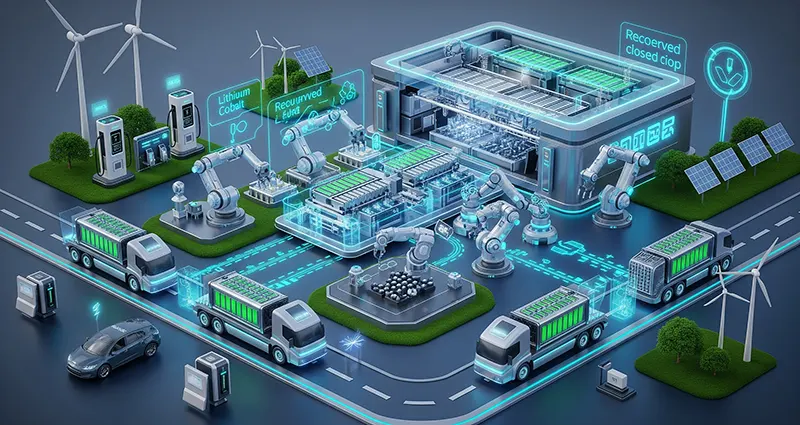As electric vehicles (EVs) continue to gain momentum globally, driven by concerns over climate change and the push for sustainable transportation, the demand for efficient electric vehicle battery recycling technology and infrastructure is becoming increasingly critical. With millions of EV batteries expected to reach end-of-life in the coming decades, the future outlook for battery recycling technology and infrastructure holds significant promise for environmental sustainability, resource conservation, and economic growth.
Growing Importance of Battery Recycling
Electric vehicle batteries, primarily lithium-ion based, contain valuable materials such as lithium, cobalt, nickel, and manganese. Proper recycling not only helps reduce environmental hazards associated with battery disposal but also recovers these finite resources, easing reliance on mining and minimizing supply chain vulnerabilities. As the volume of retired EV batteries grows, the need for scalable, cost-effective recycling solutions becomes urgent.
Innovations in Battery Recycling Technologies
The future of EV battery recycling is shaped by several promising technological advancements:
- Hydrometallurgical Processes: These methods involve using aqueous solutions to selectively extract valuable metals with high purity. They offer energy-efficient and environmentally friendlier alternatives to traditional pyrometallurgical methods (high-temperature smelting).
- Direct Recycling Techniques: Emerging processes aim to refurbish battery cells directly, preserving more of the original materials and structure, reducing energy consumption, and improving material recovery rates.
- Automation and AI Integration: Incorporating automation and artificial intelligence in the sorting and dismantling of batteries can enhance safety, efficiency, and throughput at recycling facilities.
- Advancements in Battery Design: Future EV batteries may be designed with recycling in mind, emphasizing modularity and the use of more recyclable materials, facilitating easier recovery and reuse.
Expansion of Recycling Infrastructure
The future infrastructure for EV battery recycling requires substantial investment and development:
- Establishment of Specialized Recycling Centers: These centers will be designed to handle large volumes of EV batteries safely and efficiently, ensuring adherence to environmental and safety standards.
- Integration with EV Supply Chains: Recycling facilities will increasingly integrate with battery manufacturers and EV producers to establish closed-loop systems, where recovered materials feed directly back into new battery production.
- Global Collaboration and Regulation: International cooperation and clear regulations will be vital to manage battery recycling responsibly, including standardized collection processes and certifications to ensure sustainability and safety.
- Investment Incentives and Policies: Governments and private sectors are likely to implement policies, subsidies, and incentives to promote recycling facility development and technological innovation.
Environmental and Economic Benefits
A robust battery recycling ecosystem delivers multiple advantages:
- Resource Conservation: Recycling reduces the demand for virgin raw materials, preserving natural resources and reducing environmental degradation from mining.
- Waste Reduction: Properly recycling EV batteries prevents hazardous materials from contaminating ecosystems.
- Cost Reduction: Recovering valuable metals can lower the costs of raw materials for new battery production.
- Job Creation: Expanding recycling infrastructure and technology development opens new employment opportunities in manufacturing, research, and environmental management.
Challenges to Overcome
Despite the promising outlook, challenges remain:
- Complex Battery Chemistry: Variability in battery types and chemistries complicates recycling processes.
- Economic Viability: Ensuring that recycling operations are cost-effective compared to mining is crucial.
- Safety Concerns: Handling high-energy batteries requires stringent safety protocols to prevent fires or toxic exposure.
- Collection and Logistics: Efficient systems for collecting spent EV batteries from vehicles, dealerships, and consumers are still developing.
The future of electric vehicle battery recycling technology and infrastructure is bright and pivotal for the sustainable growth of the EV market. Continuous innovation in recycling methods, strategic investments in infrastructure, supportive policy frameworks, and global collaboration will drive a circular economy that maximizes resource recovery while minimizing environmental impact. As the world accelerates its transition to electric mobility, battery recycling will stand as a cornerstone of environmental responsibility and economic resilience in the EV landscape.





